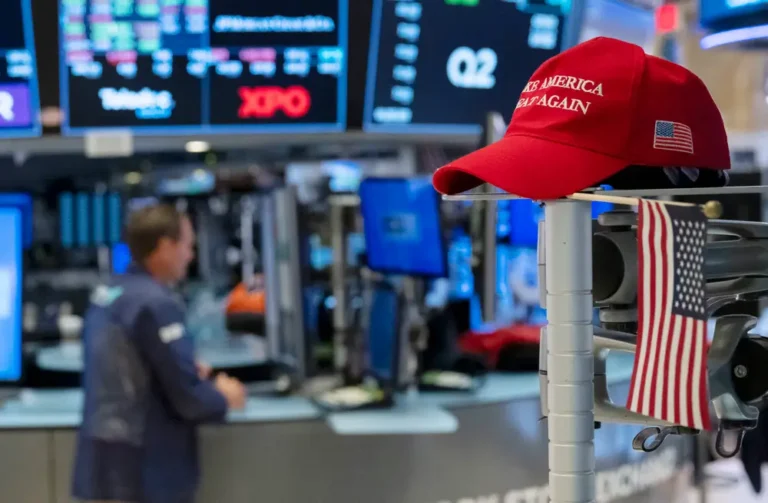A couple without a business or finance background raised $180,000 to open a taco shop. They brought in more than $1 million in revenue in year one and credit their success to 3 non-business-related factors.

Our investing experts respond to readers’ questions and write unbiased product reviews (here’s how we evaluate investing products). Paid non-client promotion: We may receive a commission from our partners in some cases. Our thoughts are always our own.
- La Tejana co-founders Ana-Maria Jaramillo and Gus May don’t have backgrounds in business or finance.
- Still, they’ve managed to build a profitable restaurant that did over $1 million in revenue in year one.
- One of their keys to success is being ‘human-first’ over ‘business-first’ on social media.
Ana-Maria Jaramillo and Gus May, co-founders of La Tejana, had enough encouragement from their regular customers — and the financial backing — to open a brick-and-mortar location after perfecting a flour tortilla recipe and hosting breakfast taco pop-ups throughout Washington, DC.
They signed a five-year lease with a five-year option to renew on a three-story space in DC’s vibrant Mount Pleasant neighborhood in January 2022.
The couple raised $180,000 from family and friends after starting tinkering in their apartment kitchen in 2019 in an attempt to recreate the breakfast tacos Jaramillo grew up eating.
That’s a small sum for a brand-new restaurant, according to May: “We were able to do it on a pretty shoestring budget.”
They did not give up any equity when raising funds, so Jaramillo and May own 100% of the company.
They essentially borrowed money from investors and devised a four-year repayment plan that began at the end of 2023, giving them about 16 months to get up and running before having to make their first payment.
“Our view is that if we’re the ones who are doing the work, then we should have complete say over the types of decisions we’re making and eventually the long-term profits,” she said. “It’s our blood, sweat, and tears going into this, so why should someone who’s lending us $10,000 be entitled to long-term profit sharing and ownership of the business just for making this investment?”
He pointed out that not all restaurant owners have the option of negotiating such favorable terms. It helped that they already had a tried-and-true concept and weren’t “desperate for money.” Furthermore, they avoided having to go through an institutional investor, which would have resulted in higher interest rates and more stringent loan agreements. “If we’re being honest, this is a function of privilege, race, and class.” We both come from families who were able to invest in us.”
May had spent years working in the food and beverage industry before being laid off at the start of the pandemic, whereas Jaramillo is a full-time speech-language pathologist and part-time professor at GWU. May now works full-time in the La Tejana kitchen, and Jaramillo handles a lot of the behind-the-scenes work, such as answering catering inquiries when she can.
“I think we both have strong entrepreneurial instincts but we don’t come from a finance or a business background,” May said. “To be honest, neither of us is a die-hard capitalist. The most important thing for us is that the numbers work out and that we can pay ourselves and our employees while continuing to grow.”
While they pay attention to details such as how well a specific taco sells, they don’t obsess over daily sales numbers and prefer to keep a “larger picture in mind,” he said.
Their strategy is effective.
They sold out of tacos in three hours on opening day in August 2022. Customers frequently queue outside the couple’s storefront.
In terms of finances, they outperformed expectations in their first year. According to profit and loss statements reviewed by Insider, they expected to make $750,000 in revenue in year one and ended up making more than $1 million. And, according to May, their profit margins are above industry averages: “We’ve been lucky to be over 15% every single month that we’ve been open.”
When asked how they’ve managed to not only survive, but thrive, in a notoriously cutthroat industry, the couple cited a number of factors, not all of which are commercial in nature.
- They provide a unique product and carry it out in a genuine manner.
Jaramillo and May realized early on that if they wanted to build a successful breakfast taco business, they needed to master the taco’s foundation: the tortilla.
Jaramillo, who spent her childhood in Monterrey, Mexico before moving to McAllen, Texas, grew up eating flour tortillas, which are “very traditional to Tex-Mex cuisine and also northern Mexico,” she explained.
Initially, they intended to get their tortillas from Texas. However, May eventually decided to take on the task herself and in-house. He looked up flour tortilla recipes online and gathered information from Jaramillo’s family and friends who had made them from scratch for years.
He said it helped that he lived with a dependable taco critic: “She really knows them — what the tortilla should taste like, how thick it should be, whether it should be chewy, if it has the right level of salt.”
It’s not just that they’ve created a unique, high-quality product — homemade flour tortillas are difficult to make and “not that many restaurants are willing to make them,” according to May — but also how they’ve chosen to present it.
“It’s a unique product and it’s brought in a genuine way,” he said. “Our story is very genuine: It’s basically a love story of Ana and I meeting, she decides to move to DC, and as a selfish desire to eat the food she grew up with, she and I started this restaurant together.”
- They value ‘human-first’ over ‘business-first’ on social media.
Jaramillo and May, like many other business owners, have used social media to grow La Tejana, noting that “a lot of the business is just built off Instagram.” However, their approach to posting on platforms such as Instagram appears to be a little different.
They describe their social media voice as “human-first, rather than business-first,” and prefer to photograph and feature their employees and customers.
“And he really writes from the heart,” said Jaramillo of May, who writes the majority of the captions. “People read the captions and they connect with the story and they share it and they post it and they comment.”
They get more engagement than other business accounts with a similar number of followers because they humanize the content, according to May: “We don’t post as frequently, but the posts that we do get a crazy amount of comments, impressions, and reshares.”
It has allowed them to connect with the Mount Pleasant and greater DC communities on a deeper level, which has made a difference.
“We’ve been able to use the shop as a vehicle for building a community that, in turn, pays itself back with bringing more people in and then buying our tacos and being part of that community,” May told the news station.
- They’ve fostered a welcoming environment among employees, which has filtered down to customers.
According to Jaramillo, good customer service is what keeps people coming back: “You can have an incredible product, but if you have the worst customer service ever, people will not come back.”
They want each customer to laugh and joke with one of their employees as well as enjoy their tacos.
“There’s a certain value to the human piece that you get when you come to the shop,” May said. “It’s not like everyone’s going to have this momentous experience but there’s enough people who like the kind of vibe that they get when they come through and that’s part of them returning.”
Jaramillo and May have created a culture of respect among their employees, which “trickles down into the interactions that our staff have with each other, first and foremost, but also in the way that they interact with customers that makes the customer feel respected.”
While May and Jaramillo believe that customer service, community engagement, and a genuine story have all contributed to their success, “I’m sure there are plenty of people who don’t give a crap about the community or the story and it’s just the tacos,” May said. “Perhaps that’s it. But this is my romanticized explanation for why we’ve been so successful.”






